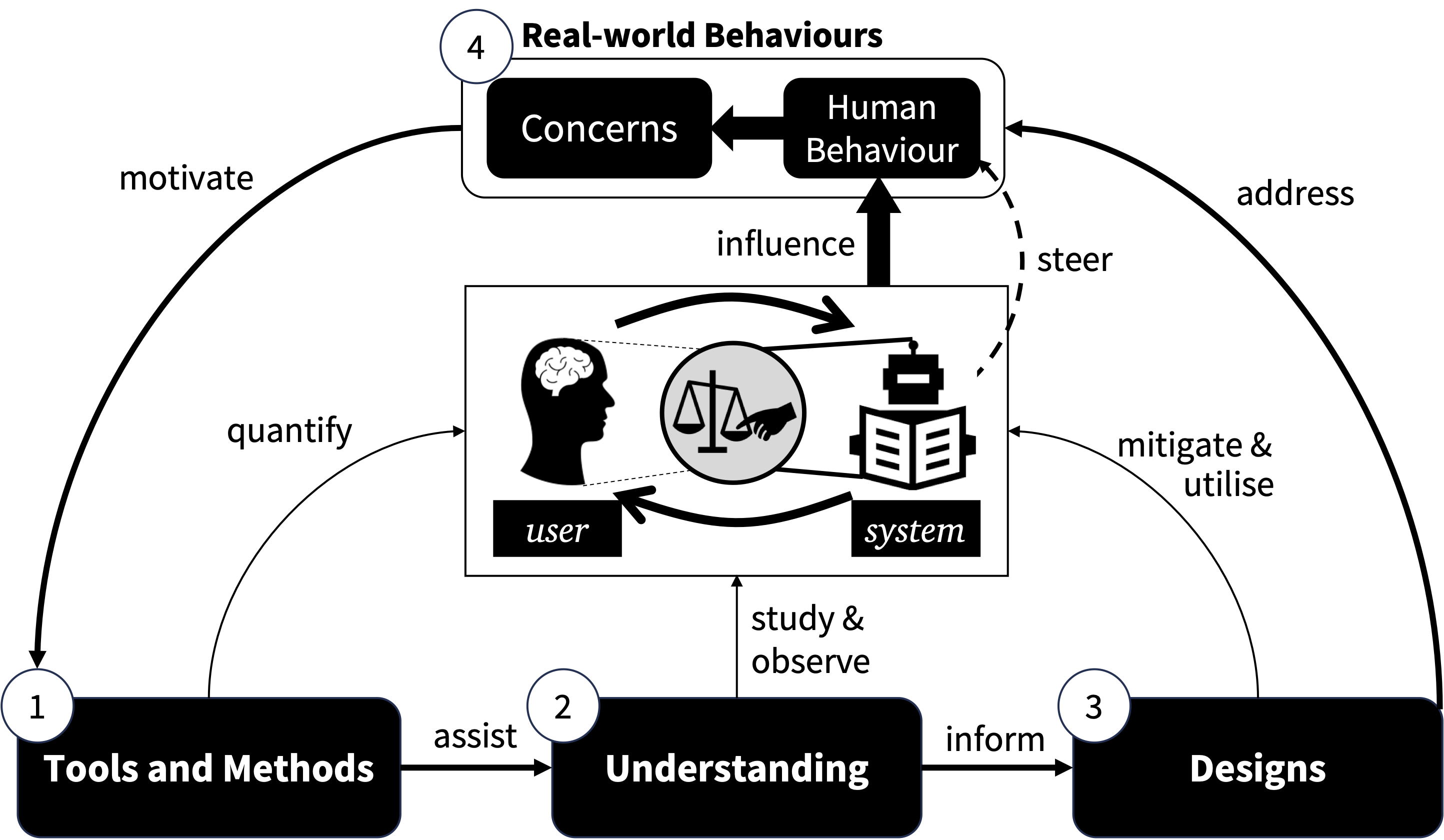Nattapat (Nat) Boonprakong, PhD
Hi and good day! I am a Postdoctoral Research Fellow in Human-Computer Interaction at the NUS School of Computing, Singapore. I work with Yi-Chieh Lee at the AI for Social Good lab. Previously, I obtained my PhD in Computer Science from the University of Melbourne, where I worked with Tilman Dingler, Benjamin Tag, and Jorge Goncalves. My research interests lie within an intersection of different disciplines such as Human-Centred AI, Behavioural Science, and Physiological Sensing. My research focuses on Quantifying and Understanding the Effects of Cognitive Biases in Human-Computer Interaction.
As a Human-Computer Interaction (HCI) researcher, my passion is to design and develop technologies that take into account cognitive biases in people, adapt to their complex and constrained mental models, and help them make conscious decisions in the real world.
My thesis has recently passed the PhD examination without corrections.
Keywords: Cognitive Biases; Human Factors; Physiological Computing; Human-Information Interaction
Outline of My Research
Modern technologies, such as AI and social media, enable new and complex ways for humans to interact with computers. However, they introduce sheer cognitive demands, time constraints, and ambiguity to users. To cope with such demands, humans apply mental shortcuts or heuristics to sift through information and effectively make decisions. However, these shortcuts result in Cognitive Biases, which systematically influence behaviour and judgment without one’s awareness. These biases can lead to devastating outcomes for users, for example, falling victim to misinformation, mistrusting or over-relying on AI assistance, and being manipulated by social engineering applications or dark patterns.

My three publications at the CHI conference outline my research around forming a systematic understanding of cognitive biases in HCI, developing methods to quantify their occurrences, and identifying user and interaction contexts that influence their effects:
- Nattapat Boonprakong, Benjamin Tag, Jorge Goncalves, and Tilman Dingler. 2025. How Do HCI Researchers Study Cognitive Biases? A Scoping Review. In CHI Conference on Human Factors in Computing Systems (CHI ’25). 🏅 Honourable Mention Best Paper (top 5%)
Systematic Understanding of Cognitive Biases in HCI: I conducted a scoping review of 127 HCI articles that study cognitive biases. Findings suggest computing systems can trigger cognitive biases, as well as provide cognitive assistance to mitigate their undesired effects. These biases introduce real-world concerns, which motivate HCI researchers to develop tools and methods to closely study their impact on HCI. The understanding of cognitive biases allows designers to take these biases into account, mitigate the undesired biases, and leverage their effects for good.
- Nattapat Boonprakong, Xiuge Chen, Catherine Davey, Benjamin Tag, and Tilman Dingler. 2023. Bias-Aware Systems: Exploring Indicators for the Occurrences of Cognitive Biases when Facing Different Opinions. In Proceedings of the 2023 CHI Conference on Human Factors in Computing Systems (CHI ‘23). 🏅 Honorable Mention Best Paper (top 5%)
Quantifying the Occurrences of Cognitive Biases: Cognitive biases happen without our awareness; therefore, it is a challenge to detect whether it is taking effect in the interaction. Physiological sensing offers a non-intrusive, more objective means to detect user cognitive states. In this study, I deployed physiological measurements (hemodynamic activity, electrodermal activity, and eye-tracking) to detect the occurrences of cognitive biases when users read different text opinions on a polarising, divisive topic (e.g., climate change, feminism, or abortion rights). In this context, users employ heuristics to read text opinions: they rely on the congruence between their ideological beliefs and the stance of the opinion they read. From the data collected, I found significant effects of ideological congruence on hemodynamic activity, particularly in participants who exhibit low involvement in the topic.
- Nattapat Boonprakong, Saumya Pareek, Benjamin Tag, Jorge Goncalves, and Tilman Dingler. 2025. Assessing Susceptibility Factors of Confirmation Bias in News Feed Reading. In CHI Conference on Human Factors in Computing Systems (CHI ’25). 📄 Paper
Understanding Bias Susceptibility: Cognitive biases do not always surface in every individual and context. A variety of factors make people more or less susceptible to biases. Based on information consumption scenarios, I conducted a study that exposed users to tweets on a polarising topic when they seek, evaluate, and recall these tweets. The result shows that factors related to user characteristics (thinking style and political belief strength) and interaction context (issue strength of the content and task design and modality) influence individuals’ susceptibility to exhibit cognitive biases.
Apart from my PhD research, I am actively involved in research communities of cognitive bias and physiological computing. I led the organisation of two successful workshops at premier HCI venues: (1) Understanding and Mitigating Cognitive Biases in Human-AI Collaboration (CSCW ‘23) and (2) Advancing Physiological Methods in Human-Information Interaction (UbiComp/ISWC ‘24).
I previously obtained a Master of Information Science and Technology from Osaka University in Japan, where I received the Japanese Government Scholarship (MEXT). My master’s thesis titled Towards Multimodal Office Task Performance Estimation led me to develop research interests in cognition-aware computing and physiological sensing. Before that, I completed a Bachelor of Computer Engineering (1st class honours) from Chulalongkorn University, Thailand.
Academic Service and Volunteering
- Associate Chair: CHI 26 Full Paper, CHI 24 LBW
- External Reviewer: CHI (25, 24, 23), ISS (24), CHI LBW (25, 24), MobileHCI LBW (24, 23) MUM (23), HAI (23), ISWC (2023), SMC (24)
- Program Chair, 2024 CIS Doctoral Colloquium
- Committee Member, CIS Graduate Researcher Society (2022-2024)
- Student Volunteer at CHI ‘25, CHI ‘23, and VIS ‘23
Awards
- Special Recognition for Outstanding Reviews (CHI’25 LBW, CHI ‘24, and ISS ‘24 Febuary Round)
- Melbourne Plus - People Leadership (2024)
- Melbourne Research Scholarship (2021)
- Japanese Government Scholarship (2018)
Teaching
- Head Tutor COMP90041 (Programming and Software Development): 2022-Present
- Tutor COMP90018 (Mobile Computing Systems Programming): 2024
